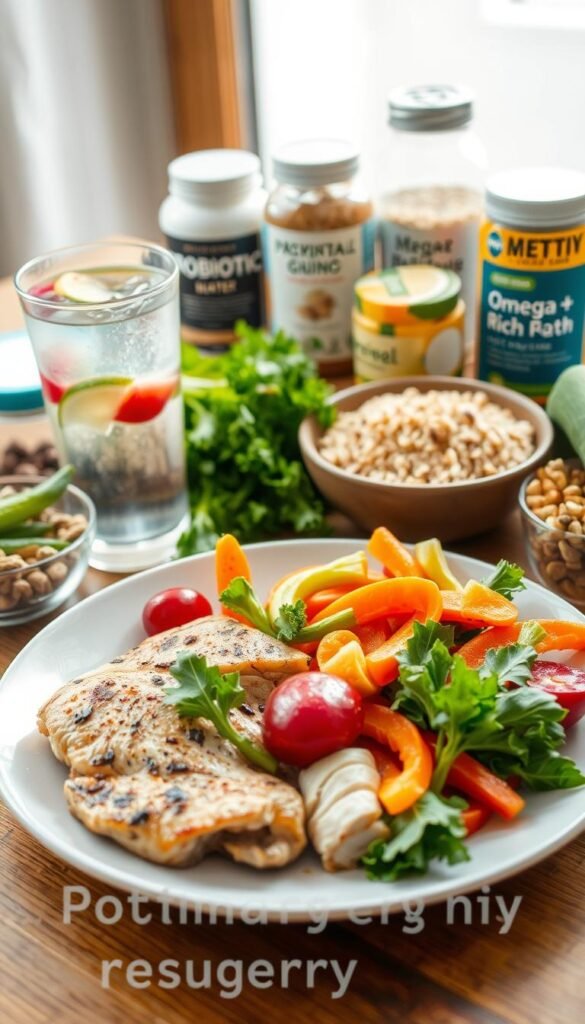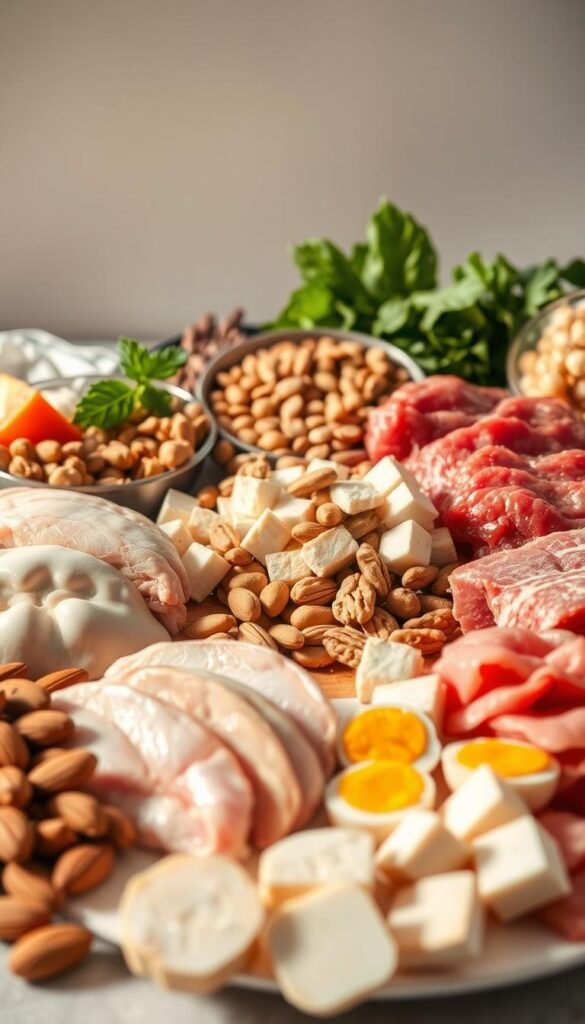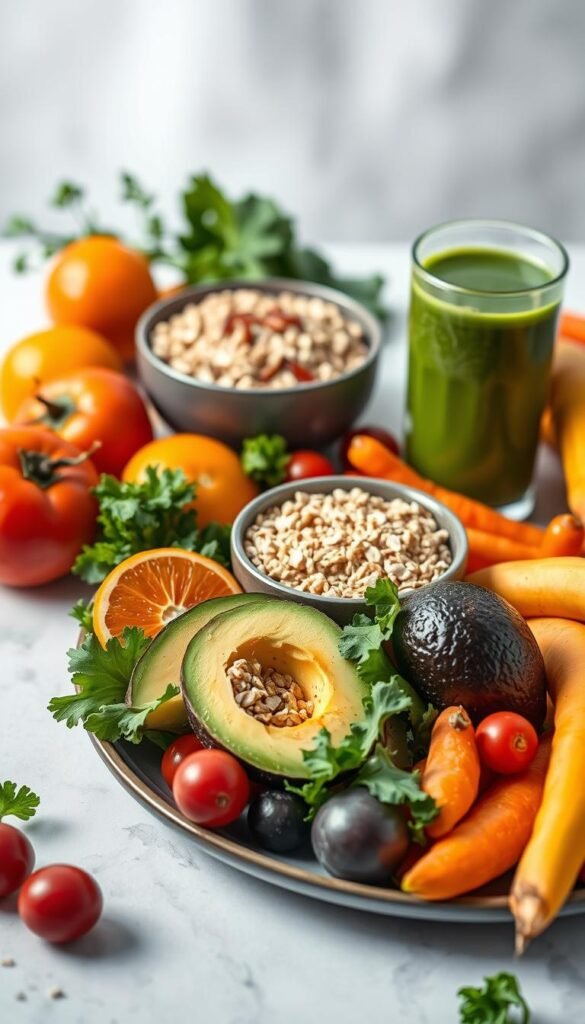Recover Faster with the Best Foods for Surgery Recovery
After undergoing surgery, your body needs the right nutrients to heal efficiently. A staggering number of patients experience complications after surgery, such as infections or decreased mobility, which can significantly prolong their recovery time.
Nutrition plays a crucial role in the healing process. Consuming the right foods can help you recover faster and reduce the risk of complications. A well-balanced diet provides your body with the necessary building blocks to mend tissues, fight off infections, and regain strength.
Eating the right foods after surgery is essential for a smooth and speedy recovery. In this comprehensive guide, we’ll explore the optimal nutrition for post-surgery healing and provide you with practical tips on creating a meal plan that supports your body’s needs.
Key Takeaways
- Eating the right nutrients after surgery can significantly impact your recovery time.
- A well-balanced diet provides essential nutrients for healing and regaining strength.
- Certain foods can help reduce the risk of complications after surgery.
- A practical post-surgery meal plan is crucial for optimal recovery.
- Nutrition plays a vital role in the healing process after surgery.
Why Nutrition Matters After Surgery
The food you eat after surgery can significantly impact your healing journey. Adequate nutrition provides your body with the necessary building blocks to recover from the surgical stress, fight off potential infections, and regain strength. A well-nourished body is better equipped to handle the demands of recovery, leading to a smoother and potentially faster healing process.
Impact of Surgery on Your Body
Surgery puts your body under significant stress, affecting various physiological processes. It can lead to a catabolic state where your body breaks down tissues to meet its energy needs. Proper nutrition helps counteract this effect by providing essential nutrients that support healing and recovery. Your body’s nutritional needs increase after surgery to facilitate tissue repair and regeneration.
The Role of Food in Healing
Food serves as more than just sustenance during your recovery; it acts as medicine. Nutrient-rich foods help rebuild tissues, create new blood vessels, and strengthen your immune response. Certain foods contain compounds that can reduce inflammation and promote faster wound closure. For instance, a diet rich in vitamins C and E, zinc, and protein can significantly enhance your body’s healing capabilities.
| Nutrient | Role in Healing | Food Sources |
|---|---|---|
| Protein | Rebuilds tissues and supports immune function | Lean meats, fish, eggs, legumes |
| Vitamin C | Enhances collagen synthesis and wound healing | Citrus fruits, berries, leafy greens |
| Zinc | Supports immune function and wound healing | Oysters, beef, chicken, fortified cereals |

“The right nutrition is crucial for recovery, as it provides the body with the necessary tools to heal and rebuild itself stronger.”
— Expert in Nutrition and Recovery
By focusing on nutrient-dense foods, you can support your body’s natural healing processes and potentially reduce recovery time. It’s not just about consuming any calories; it’s about giving your body the right nutrients to rebuild and restore its functions.
The Best Food for Surgery Recovery: Protein-Rich Options
After surgery, your body needs the right nutrients to heal efficiently, and protein is at the forefront of this recovery process. Consuming enough protein helps your body repair tissues and fight off potential infections.
Lean Meats and Poultry
Lean meats like chicken, turkey, and lean beef are excellent sources of protein. They provide essential amino acids that your body needs to heal.
Eggs: Nature’s Perfect Recovery Food
Eggs are a versatile and easily digestible protein source. They are rich in vitamins and minerals that support the healing process.
Plant-Based Protein Sources
For those who prefer or require plant-based options, foods like beans, lentils, nuts, and tofu are excellent alternatives. Legumes such as lentils and chickpeas not only provide protein but also fiber, which can help prevent post-surgery constipation.
| Protein Source | Benefits |
|---|---|
| Beans and Lentils | High in protein and fiber |
| Nuts and Seeds | Rich in healthy fats and protein |
| Tofu | Complete protein source, may reduce inflammation |

Fruits That Speed Up Healing
Fruits play a crucial role in speeding up the healing process after surgery, providing essential nutrients and antioxidants. Consuming the right fruits can help your body recover more efficiently, reducing the risk of complications and promoting overall well-being.
Antioxidant-Rich Berries
Berries such as strawberries, blueberries, and raspberries are rich in antioxidants, which help combat oxidative stress and inflammation. These fruits are not only delicious but also packed with vitamins and minerals that support the healing process. Incorporating a variety of berries into your diet can provide your body with the necessary building blocks for recovery.
Fruits High in Vitamin C
Vitamin C is crucial for collagen synthesis, which directly impacts how quickly your surgical wounds heal. Citrus fruits like oranges, grapefruits, and lemons are well-known for their high vitamin C content. Additionally, tropical fruits such as papaya, kiwi, and guava contain even higher levels of vitamin C, along with natural enzymes that can aid digestion, which may be sluggish after surgery.
| Fruit | Vitamin C Content | Additional Benefits |
|---|---|---|
| Orange | High | Hydrating fluids |
| Kiwi | Very High | Aids digestion |
| Papaya | High | Contains natural enzymes |

The bright colors of vitamin C-rich fruits indicate the presence of additional phytonutrients that support healing. By incorporating these fruits into your post-surgery diet, you can enhance your body’s natural recovery processes and potentially reduce the risk of complications.
To maximize the benefits, aim to include a variety of fruits in your diet. A balanced intake of different fruits will ensure that you receive a broad spectrum of vitamins, minerals, and antioxidants necessary for optimal healing.
Vegetables for Post-Surgery Nutrition
Vegetables are packed with essential nutrients that can significantly aid in your post-surgery recovery. They provide a broad spectrum of vitamins, minerals, and phytonutrients that support various aspects of healing.

Leafy Greens and Their Benefits
Leafy greens such as spinach and kale are rich in antioxidants and other nutrients that support the healing process. These vegetables are high in vitamin K, which is crucial for blood clotting, and they also contain folate, which aids in tissue repair.
Colorful Vegetables for Recovery
Colorful vegetables like carrots, sweet bell peppers, broccoli, and sweet potatoes are not only visually appealing but also packed with nutrients. Orange and yellow vegetables are rich in vitamin A, supporting epithelial tissue repair. Red vegetables like bell peppers provide lycopene and vitamin C, which are essential for collagen formation. Cruciferous vegetables such as broccoli and Brussels sprouts contain compounds that support liver detoxification, reducing inflammation and oxidative stress during recovery.
Whole Grains for Sustained Energy
After surgery, your body needs the right fuel to recover, and whole grains are an excellent source of sustained energy. Carbohydrates provide your brain with energy and stop muscle from breaking down. You are going to feel tired and worn out following your surgery, and the right kind of carbs will bring your energy levels up.
Whole grains are rich in complex carbohydrates, fiber, and various nutrients that are essential for your recovery. They help in maintaining your energy levels and supporting your overall healing process.
Best Whole Grain Options
Incorporating the right whole grains into your diet can make a significant difference in your recovery. Some of the best whole grain options include brown rice, quinoa, whole wheat bread, and whole grain pasta. These foods are not only rich in carbohydrates but also provide fiber and essential nutrients.
| Whole Grain | Nutritional Benefits |
|---|---|
| Brown Rice | Rich in fiber, manganese, and selenium |
| Quinoa | Complete protein, rich in iron and magnesium |
| Whole Wheat Bread | High in fiber, B vitamins, and minerals |
How Carbohydrates Support Healing
Carbohydrates are your body’s preferred source of energy, sparing protein for its critical role in tissue repair. Complex carbohydrates from whole grains provide steady energy that helps prevent the fatigue common during recovery. Your brain relies heavily on glucose from carbohydrates, helping you maintain mental clarity during healing. Adequate carbohydrate intake prevents your body from breaking down muscle tissue for energy. The fiber in whole grain carbohydrates supports digestive health, which can be compromised after surgery.
By incorporating whole grains into your post-surgery diet, you can ensure that your body has the necessary fuel to recover efficiently. Whole grains not only provide sustained energy but also support overall health and well-being.
Healthy Fats That Promote Healing
The right fats can help you recover faster by providing a long-lasting source of energy. Healthy fats are essential for overall health and play a significant role in the recovery process after surgery.
Omega-Rich Foods
Omega-rich foods, such as walnuts, are beneficial for recovery due to their high content of omega-3 fatty acids and antioxidants. These nutrients support overall health and can aid in the healing process.
- Walnuts contain both omega-3 fatty acids and antioxidants that support overall recovery.
- Other omega-rich foods can be incorporated into your diet to enhance recovery.
Nuts and Seeds for Recovery
Nuts and seeds are not only rich in healthy fats but also provide protein and fiber, making them ideal recovery snacks. They offer concentrated nutrition in small portions, which is particularly beneficial when your appetite is reduced after surgery.
- Nuts and seeds provide concentrated nutrition in small portions, ideal when appetite is reduced after surgery.
- Almonds are particularly rich in vitamin E, which supports skin healing and may help reduce scarring.
- Seeds like pumpkin and sunflower seeds provide zinc and other minerals essential for tissue repair.
Hydration: The Overlooked Recovery Essential
Proper hydration is essential for your body to recover efficiently after surgery. Staying hydrated helps your body heal faster, reduces the risk of complications, and supports overall well-being.
After surgery, it’s crucial to maintain adequate fluid intake. Water intake guidelines can vary, but generally, you should aim to drink at least eight glasses of water a day, unless otherwise advised by your healthcare provider.
Guidelines for Water Intake
To stay hydrated, consider the following tips: drink water regularly throughout the day, and monitor your urine output to ensure it’s pale yellow or clear. If plain water is unappealing, you can try flavoring it with lime or lemon.
Alternatives to Plain Water
If drinking plain water is not appealing, there are other hydrating options. You can try drinking coconut water, eating high water content foods like soup, or preparing a smoothie with extra fluid. Herbal teas, such as chamomile or peppermint, can also provide hydration while addressing common post-surgery issues.
| Hydration Options | Benefits |
|---|---|
| Coconut Water | Provides natural electrolytes that help maintain proper fluid balance |
| Herbal Teas | Offers hydration while addressing common post-surgery issues like nausea or discomfort |
| High Water Content Foods | Contributes to overall fluid intake, with examples including watermelon, cucumber, and oranges |
Probiotics for Digestive Health During Recovery
Probiotics are essential for a smooth recovery after surgery, supporting your overallhealthandimmune system. After surgery, your digestive system can be disrupted, leading to discomfort and potentially slowing down the recovery process.
When you undergo surgery, your gut health can be affected in various ways. The stress of surgery, combined with potential antibiotic use, can disrupt the balance of your gut microbiome. This imbalance can lead to digestive issues, such as diarrhea or constipation, and may even impact your overall recovery.
Gut Health After Surgery
Surgery can significantly impact your gut health, leading to an imbalance in your microbiome. This imbalance can cause a range of issues, from mild discomfort to more serious complications. Maintaining a healthy gut during this period is crucial for a smooth recovery.
Some of the most common forms of probiotic-rich foods include yogurt, kefir, sauerkraut, and kimchi. These foods can help regulate your digestive system and support your overall health.
Probiotic-Rich Food Sources
Incorporating probiotic-rich foods into your diet can be simple and delicious. You can enjoy:
- Yogurt with live active cultures, providing beneficial bacteria along with protein and calcium for recovery.
- Kefir, which offers even more probiotic strains than yogurt and is often better tolerated by those with lactose sensitivity.
- Fermented vegetables like sauerkraut and kimchi, which provide probiotics along with fiber and vitamins.
- Kombucha, a refreshing beverage that offers probiotics and can help with hydration.
- Miso and tempeh, fermented soy products that provide both probiotics and plant-based protein.
Including these probiotic-rich foods in your diet can help support your digestive health and overall recovery after surgery. A healthy dose of probiotics can help regulate your system, ensuring that your body is able to heal efficiently.
13 Essential Nutrients for Post-Surgery Healing
The right nutrients can significantly impact your recovery after surgery. Ensuring you get the necessary vitamins and minerals is crucial for optimal healing.
Vitamins That Support Recovery
Vitamins play a critical role in the healing process. They help support immune function, reduce inflammation, and promote tissue repair. Key vitamins include Vitamin C, which is essential for collagen synthesis and wound healing, and Vitamin D, which supports bone health.
Minerals Your Body Needs After Surgery
Minerals are equally important for post-surgery recovery. They help maintain various bodily functions, including nerve and muscle function. Essential minerals include:
- Calcium: crucial for bone healing and muscle function. Top sources include kale, yogurt, and almonds.
- Iron: vital for producing new red blood cells after blood loss during surgery. Include garbanzo beans, spinach, and cashews in your diet.
- Magnesium: supports muscle and nerve function, promoting restful sleep. Nuts, seeds, and avocado are rich in magnesium.
- Potassium: helps maintain fluid balance and supports heart and muscle function. Consume squash, sweet potatoes, and white beans.
By focusing on these essential nutrients, you can support your body‘s healing process and recover more efficiently after surgery.
Foods to Avoid After Surgery
To recover faster and more effectively from surgery, your dietary choices are critical. Certain foods can hinder the healing process, so it’s essential to know what to avoid.
Why Added Sugars Slow Recovery
Consuming high amounts of added sugars can impede your recovery by suppressing your immune system and increasing inflammation. Limit foods and beverages with added sugars to aid in your healing.
Processed Foods and Their Impact
Processed foods often contain unhealthy ingredients that can prolong recovery. They tend to be high in sodium, preservatives, and unhealthy fats, which can lead to inflammation and other complications.
Alcohol and Medication Interactions
Alcohol can interact dangerously with post-surgery medications, particularly pain relievers. Drinking alcohol thins the blood, increasing the risk of bleeding and slowing wound healing. It also impairs your immune system and can disrupt sleep patterns, further complicating recovery. Moreover, mixing alcohol with pain medication can be deadly.
| Foods to Avoid | Reason for Avoidance |
|---|---|
| Added Sugars | Suppresses immune system, increases inflammation |
| Processed Foods | High in sodium, preservatives, unhealthy fats |
| Alcohol | Interferes with medication, thins blood, disrupts sleep |
Creating a Post-Surgery Meal Plan
To aid in your recovery, it’s essential to focus on a diet rich in nutrients. A well-structured meal plan can help ensure you’re getting the necessary foods to support your healing process.
Sample Day of Healing Foods
A sample day of meals might include nutrient-dense options like smoothies made with Greek yogurt, frozen berries, and spinach. These provide essential vitamins and minerals in an easily digestible form.
For breakfast, consider overnight oats prepared the night before, which can be ready to eat with no preparation required. Lunch could be a sheet pan meal with lean protein and roasted vegetables, offering balanced nutrition with minimal effort.
Easy-to-Prepare Recovery Meals
Some easy-to-prepare meal ideas include batch-cooked soups and stews that can be frozen in individual portions for quick reheating. Simple protein and vegetable wraps using pre-cooked rotisserie chicken also minimize preparation time.
| Meal Type | Food Options | Benefits |
|---|---|---|
| Smoothies | Greek yogurt, frozen berries, spinach | Easy to digest, rich in vitamins and minerals |
| Sheet Pan Meals | Lean protein, roasted vegetables | Balanced nutrition, minimal preparation |
| Overnight Oats | Oats, milk, fruits, nuts | Convenient, nutrient-rich |
By incorporating these meal ideas into your post-surgery diet, you can support your recovery and ensure you’re getting the necessary protein and nutrients.
Managing Common Post-Surgery Dietary Challenges
Post-surgery dietary challenges are common, but there are ways to manage them effectively. After surgery, your body needs the right foods to heal properly. However, issues like low appetite and constipation can arise, complicating the recovery process.
Dealing with Low Appetite
It’s not uncommon to experience a decrease in appetite after surgery, often due to pain medication or the body’s response to the surgical stress. To manage this, try consuming smaller, more frequent meals. Incorporating nutrient-rich foods into your diet can help ensure you’re getting the necessary nutrients for recovery.
Preventing Constipation Through Diet
Constipation is a common side effect of surgery, largely due to pain medication and reduced mobility. Increasing your intake of fiber-rich fruits, vegetables, and whole grains can help. Additionally, staying well-hydrated by drinking at least 8 cups of water daily is crucial. Foods like prunes or prune juice can also provide relief.
| Dietary Change | Benefit |
|---|---|
| Increasing fiber intake | Reduces constipation |
| Staying hydrated | Prevents constipation and supports overall recovery |
| Consuming nutrient-rich foods | Supports healing and recovery |
When to Consult a Nutritionist About Your Recovery Diet
While general dietary advice is available, knowing when to consult a professional can make a significant difference in your recovery. After surgery, your body’s nutritional needs are unique, and a nutritionist can provide personalized guidance to ensure you’re fueling your body correctly for optimal healing.
Signs You Need Professional Dietary Guidance
If you’re experiencing difficulties such as a lack of appetite, food aversions, or digestive issues during your recovery, it may be time to seek professional help. A nutritionist can help you identify the best foods for your condition and create a plan to overcome these challenges. They will assess your current nutrition and health status to provide tailored advice.
What to Expect from Nutritional Counseling
During your consultation, a nutritionist will conduct a comprehensive assessment of your nutritional status, medical history, and surgery details. They will then develop a personalized eating plan that addresses your specific recovery needs, including strategies for managing common post-surgery dietary challenges. You can expect guidance on appropriate supplements if needed, as well as follow-up appointments to adjust your plan as your recovery progresses.
Conclusion
A successful recovery from surgery isn’t just about giving your body time to heal, but also about fueling it with the right nutrients. Proper nutrition is one of the most powerful tools you have for a successful recovery after surgery. By incorporating a balanced diet rich in protein, fruits, vegetables, whole grains, and healthy fats, you provide your body with the necessary building blocks for healing and reducing the risk of infection.
Always follow your healthcare provider’s specific instructions regarding your post-surgery diet, as the types of foods you should eat may vary depending on your surgery and medications. Investing in good nutrition after surgery pays dividends in faster recovery, reduced complications, and a quicker return to normal activities.

